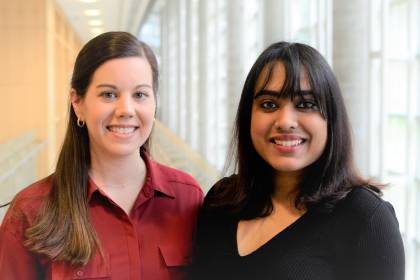Johns Hopkins University is adopting a vision of professional development and life design for PhD students and postdoctoral fellows that emphasizes experiential learning, mentoring, and frequent exposure to those core job skills that are highly valued in the work place but may not be reflected in a person's curriculum vitae.
Along with the university's ambitious changes to the way it prepares students for careers, PHutures will serve as the hub for PhD and postdoc professional development and life design, a philosophy of career development that takes a holistic view of students' curiosity and empowers them to experiment, prototype, and connect. Building on the success of the Professional Development and Career Office on the university's East Baltimore campus, PHutures will develop programs, content, and events focusing on work skills such as communication, resiliency, leadership, networking, and relationship-building on the Homewood campus initially and eventually across the entire university in partnership with PDCO. It will also take steps to strengthen the university-to-career pipeline by developing relationships with employers and alumni. The office will also partner with faculty—who are among the most important and influential figures for PhDs and postdocs—to promote a life design approach to career preparation.
"In creating a professional development program that covers these core competencies and creates opportunities for students to meet employers and alumni and sustain those relationships, I think our PhDs and postdocs will feel more prepared to start exploring their options and living out their own life purposes," says Roshni Rao, the inaugural director of PHutures.
According to Rao, the PhD and postdoc community at Hopkins, as in most of academia, is focused primarily on the goal of publishing, whether that's by completing and submitting laboratory studies to peer-reviewed journals or researching and writing dissertations. But as more and more PhD and postdocs leave academia to pursue jobs in industry—nationwide, only about 20% of PhD students stay within the academic tenure-track route—the needs of this community have evolved. PHutures will provide job skills training that fits into the already demanding schedules of PhD students and postdocs and, in some cases, will offer culturally sensitive mentoring and programming designed to support this diverse population.
Rao herself can relate to the experiences of many of the PhD students and postdocs at Johns Hopkins. She came to the U.S. from India 10 years ago to pursue a PhD in biomedical science at the University of South Carolina, and later completed a postdoctoral fellowship in immunology at the U.S. Food and Drug Administration. As a PhD candidate and postdoc, Rao says she encountered many of the same barriers to career preparedness that she hopes to help Hopkins students overcome with PHutures.

Image caption: Kate Bradford (left) and Roshni Rao are working together to model the PHutures office after the Professional Development and Career Office on the university’s East Baltimore campus.
Image credit: Courtesy of Roshni Rao
"There were many basic life skills that I hadn't been exposed to in school," Rao says. "How do I network, and how do I maintain those relationships? How do I smash an interview, and what do I wear to an interview? What do I do when I meet with an employer? No one told us these things, but they're fundamental to finding success in a career."
Rao later joined the National Institute on Aging as the associate director of postdoctoral affairs, where she helped design and lead programs to help postdocs prepare for their careers.
"We struck gold when we found Roshni to serve as the inaugural director of PHutures," says Farouk Dey, vice provost for integrative learning and life design at Johns Hopkins. "The work she has done was groundbreaking in terms of building community, creating a following, creating a safe space for exploration, and building relationships with faculty who became partners in her mission. But most importantly, she cares about the experiences and success of PhDs and postdocs because she's been one."
Rao is currently in a 90-day listening period, during which she will meet with student groups, postdoctoral associations, faculty, and staff to better understand the culture at Johns Hopkins and the specific needs of the PhD and postdoc community. While she completes this tour, she's also working closely with Kate Bradford, associate director of career services at the Professional Development and Career Office, which is part of the School of Medicine but serves all PhD students and postdocs on the East Baltimore campus.
The PDCO provides internship programming and career skills training for students to take part in experiential learning and explore career options. Among their more successful programs are the three-minute thesis competition, an internship program, and the OPTIONS curriculum, a series of career development programs and workshops that in some cases are required for graduate students in certain programs.
"The graduate population and PhD workforce has changed over the past few decades, and that means the model of graduate education must change, too," says Bradford, who completed her PhD at JHU's Krieger School of Arts and Sciences. "We want our graduate students and postdocs to be prepared for careers beyond academia. In order to do that, we need to teach them not only what these jobs are but also the skills and experiences they can engage with during their time at Hopkins so they can launch these careers when they're ready."
The university has been working to reinvigorate its professional development and life design offerings for PhDs and postdocs since last year, when it announced a new investment in initiatives relating to mentoring, professional development, and data gathering to help students identify career paths and networking opportunities. Among those initiatives supported by the funding is the creation of the PHutures office.
"Roshni's new position underscores the university's commitment to helping ensure PhDs and postdocs understand the wide array of options available to them after they receive their specialized training at Johns Hopkins," says Nancy Kass, vice provost for graduate and professional education at Johns Hopkins. "They need to have the space and the support to discuss these options, but they also need opportunities to be exposed to a wider range of people working in careers relevant to them, and they need opportunities to learn new skills to advance in those careers. In short, PHutures helps PhDs and postdocs learn about and prepare for career options they may not have known existed."
Posted in University News
Tagged integrative learning and life design, farouk dey, career services










